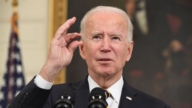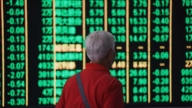【新唐人2013年08月29日讯】自“中国梦”一词在2013年两会上被首次提出后,所引发的争议从未间断。今年5月,中共中央统战部、全国工商联又将诠释“中国梦”的对像转向了民营企业家群体,一时间各地报告会不断,试图以此来证明当局对民营企业家的所谓“扶持”。但企业家却纷纷表示,中国民营企业恶劣的生存环境令人难以想像,公权力的不作为和滥作为已经成为民营经济发展的重大障碍,而他们也随时堕入牢狱“噩梦”。
大陆媒体《南都网》一篇文章透露,据一项不完全统计显示,近十多年来中国至少有上百名有影响的民营企业家落马。其中担任过全国人大代表、全国政协委员职务的至少有15人,福布斯或胡润百富榜上榜富豪至少有23人,被当局授予过各种荣誉的超过40人,身家过亿或者号称身家过亿的富豪过百人。
文章还表示,经过了解后会发现,上述大部分企业家的落马的背后都有政府的影子,他们的身陷囹圄、企业负债甚至破产,并非因为市场经济中的优胜劣汰,而是来自于非市场力量的政治风险。
大陆企业投资商余新永:“现在的企业家们,实际上他们自身权益的被侵害也比比皆是,他们安全性也是感觉到非常的得不到保障,企业家与社会的关系,应该说是一个大笼子下面的,必须对政府指令也好或者要求也好,必须执行的一个形势。”
评论多认为,由于中国特殊的政治体制,造成了政府对资源拥有绝对分配的权力,民营企业不依附于政府就会遭遇百般刁难,步履维艰。
余新永:“现在中国社会不是一个完全依法行事的社会,它是一个潜规则无处不在的一个社会。它很难说完完全全的以市场的经济行为来行事,必须要配合政府所谓的‘经济开发’啊、‘财政税收政策’以及相关的经济政策,你只要跟它合作,你就安然无事,就能够挣钱,中国这个社会,你完全按照市场行事的话,你很难挣到钱的。”
于是,无数民营企业家开始绞尽脑汁的与政府甚至官员个人建立起密切关系,希望提高企业的政治保险系数,最大限度地利用体制内资源发展自身。
北京天则经济研究所副所长冯兴元:“说是在商言商,实际上他可能是依附于公共权力,因为中国最近几年行政垄断加剧,政府权力更膨胀。在这种环境下,一些民营企业采取依附于国有企业,想方设法跟国有企业搞好关系,分一点羹。”
但民营企业家们很快发现,自己是在“与虎谋皮”,虽然大量的精力和资源不断的消耗在企业寻求的政治关系和靠山身上,但他们依然随时有可能在政治斗争中被抛弃,甚至私人财产被当局以公权力名义侵吞。
冯兴元:“因为个人的权益没保护好,所以很容易被一些官员选择性的破坏,很容易就被抓起来、很容易被判刑,甚至被判处死刑。”
湖南太子奶集团总裁李途纯接受媒体记者采访时曾说:“我目睹许多中国民营企业家把企业一做大后便被抓,上市几乎等于进牢狱,终身饮恨牢狱。”
余新永:“你不听话的话,它就很容易就把给你打下去了,它翻脸翻得很快,它长官意志嘛,它根本不按照经济规律来,不考虑社会的公正或者说对整个社会的贡献或者影响。他只考虑我这一届能够得到多少财政收入,至于企业家本身感受和社会公正问题,谁给你考虑那么多啊?”
曾被称为“中国民营航空第一人”、“6521”的东星航空集团前董事长兰世立,因为与政府官员交恶,不仅企业失去了东山再起的机会,连他本人也惨遭牢狱之灾,他在服刑期间曾说:“不能把民企当成猪一样养肥了就杀掉”,成为了企业界的一句名言。
采访/ 陈汉 编辑/ 张天宇 后制/黎安安
100 Renowned Private Entrepreneurs Jailed In Last Decade
The term, “China Dream", continues to be controversial
since it was first proposed at that 2013 “Two Sessions".
In May, private entrepreneurs became newly
supporting evidence for the Chinese Communist
Party(CCP) to justify its “China Dream".
The CCP is boasting about its “supportive
polices" given to private entrepreneurs.
In contrast, the entrepreneurs have revealed
“unimaginably harsh" circumstances for
the survival of private enterprises in China.
Lack of action, and abuse of authority, are deemed as major
obstacles to economic growth in China’s private sector.
Currently, China’s private entrepreneurs
face the “nightmare" of being put in jail.
The website of Southern Metropolis Daily released a
report detailing incomplete data over the last decade.
It shows at least 100 famous Chinese
private entrepreneurs were put in jail.
Among them, 15 held membership in the National People’s
Congress, and National Political Consultative Conference.
22 were placed on the Forbes and Hurun rich lists.
Over 40 had received awards and honors from the CCP
authorities. Over 100 owned assets worth 100 million Yuan.
The news says that the arrest of most of these
entrepreneurs had links with the authorities.
Their imprisonment, incurring debt or going bankrupt,
was not due to business failures, but political risks.
Yu Xinyong, Entrepreneur, China: “Today in China,
infringement of entrepreneur rights and interests is common.
They cannot even guarantee their personal safety.
The entrepreneurs, as if being caged, have
to follow instructions given by the authorities."
Observers agree that China’s unique political
system entitles the government to absolute power.
Private enterprises, if disobedient, are subject
to various obstacles created by the authorities.
Yu Xinyong: “So far, Chinese society is not fully
under the rule of law, but filled with hidden rules.
It is hardly based on market economic rules.
Enterprises have to cooperate with authorities in carrying
out policies on economic development or tax levy, etc.
If you do, you’ll pass and can make money.
If you follow normal market economy
rules in China, you can hardly earn money."
Thus lots of private entrepreneurs have tried to establish
close relationships with the CCP authorities and officials.
They want to enhance their political safety.
This can maximize their survival capabilities
within the red lines drawn by the CCP authorities.
Feng Xingyuan, Deputy Director,
Unirule Institute of Economics, Beijing:
“In reality, businessmen may be
shielded by some public authorities.
Recently, the power of China’s administrative
monopoly and government has grown.
Some private enterprises have bound themselves to
state-owned enterprises, to take a share of the pie."
However, these private entrepreneurs soon
discovered that this was a doomed strategy.
They have spent great resources
on seeking reliable political patrons.
Yet, they can still be abandoned at
any time during political struggles.
Sometimes, their personal assets can even
be confiscated in the name of public authority.
Feng Xingyuan: “They had failed in
protecting their own rights and interests.
So some officials could selectively arrest some
entrepreneurs and jail them, or even execute them."
Li Tuchun, President of Hunan Prince
Milk Group, once spoke to media.
“I’ve witnessed many Chinese private entrepreneurs’
be arrested, after their business became successful.
When their companies went pubic, it was
almost always the time for their entry into jail.
There they will spend the rest of their life."
Yu Xinyong: “If you’re disobedient,
you’ll be easily stepped on.
You’ll see the officials all of a sudden turn hostile.
They have never followed the rules of economics.
And neither have they considered
social justice or any social impact.
They just care about fiscal revenue
generated during their tenures.
Who cares about the entrepreneurs’
feelings or social justice issues?"
Lan Shili, known as number one of Chinese private aviation,
was once rated as the richest man in Hubei Province.
Lan fell foul of some CCP officials, and subsequently lost
a chance to make a comeback, and was even put in jail.
During his imprisonment, he said that “private enterprises
cannot be treated like pigs, that is, killed after fattening."



























